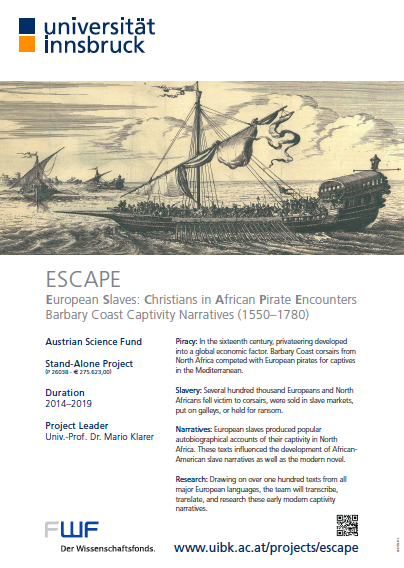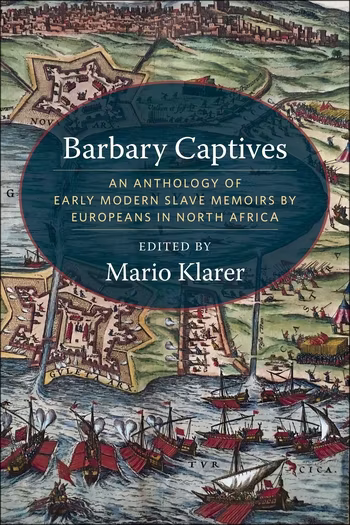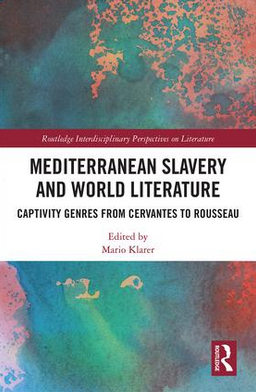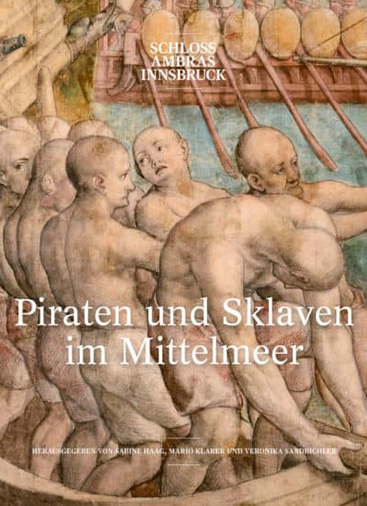Project publications and degree theses (including SLAVES and The Boundaries of Fact and Fiction)
Publications
Klarer, Mario, editor. Barbary Captives: An Anthology of Early Modern Slave Memoirs by Europeans in North Africa. New York: Columbia University Press, 2022. xiv + 398 pp.
In the early modern period, hundreds of thousands of Europeans, both male and female, were abducted by pirates, sold on the slave market, and enslaved in North Africa. Between the sixteenth and the early nineteenth centuries, pirates from Algiers, Tunis, Tripoli, and Morocco not only attacked sailors and merchants in the Mediterranean but also roved as far as Iceland. A substantial number of the European captives who later returned home from the Barbary Coast, as maritime North Africa was then called, wrote and published accounts of their experiences. These popular narratives greatly influenced the development of the modern novel and autobiography, and they also shaped European perceptions of slavery as well as of the Muslim world.
Barbary Captives brings together a selection of early modern slave narratives in English translation for the first time. It features accounts written by men and women across three centuries and in nine different languages that recount the experience of capture and servitude in North Africa. These texts tell the stories of Christian pirates, Christian rowers on Muslim galleys, house slaves in the palaces of rulers, domestic servants, agricultural slaves, renegades, and social climbers in captivity. They also depict liberation through ransom, escape, or religious conversion. This book sheds new light on the social history of Mediterranean slavery and piracy, early modern concepts of unfree labor, and the evolution of the Barbary captivity narrative as a literary and historical genre.
Reviews
Barbary Captives is a singularly inventive anthology of captivity narratives that charts the experience of Mediterranean captivity and enslavement in the early modern era. These narratives of enslaved Europeans in North Africa provide a remarkably nuanced perspective on religious tensions and political conflicts within Europe and across the Mediterranean region. The experience of captured Europeans enhances our historical knowledge of the experience of Black slavery across the Atlantic. Mario Klarer’s anthology traces a wide interdisciplinary and intertextual arc that bridges historical archives with literary genres. Klarer’s careful editorial eye opens up a world of scholarly inquiry that was hitherto hidden and obscured.
Homi K. Bhabha, author of The Location of Culture
The published and manuscript narratives compiled by Europeans seized and enslaved by Muslim corsairs are rich but complex and controversial sources. Mario Klarer has done readers interested in the varieties of early modern captivity a great service by combining and editing examples of this genre from nine different European regions and over a span of three centuries.
Linda Colley, author of The Gun, the Ship, and the Pen: Warfare, Constitutions, and the Making of the Modern World
An important and deeply revealing collection of texts. Shedding light on the rise of the novel, the modern autobiography, and the reception of African American slave narratives, this book maps uncharted territory in literature and history alike.
Stephen Greenblatt, author of The Swerve: How the World Became Modern
Barbary Captives is an immensely valuable resource both for the cultural history of Old World slavery represented in the memoirs of Europeans from Iceland to Spain held captive in Muslim lands and for the history of genre, the literary history of the novel and of later narratives of Black slavery with which the memoirs in this collection are intimately entwined. It is a work of global history in granular detail.
Thomas W. Laqueur, author of Making Sex: Body and Gender from the Greeks to Freud
Reviews
Review of Barbary Captives: An Anthology of Early Modern Slave Memoirs by Europeans in North Africa by John Chamberlin in H-Net Reviews, April 2024, URL: https://www.h-net.org/reviews/showrev.php?id=58608.
Review of Barbary Captives: An Anthology of Early Modern Slave Memoirs by Europeans in North Africa by Daniel J. C. Brooks in International Journal of Maritime History, vol. 36, no. 2, 2024, URL: https://doi.org/10.1177/08438714241230405.
Review of Barbary Captives: An Anthology of Early Modern Slave Memoirs by Europeans in North Africa by Cindy Vallar in Goodreads, 19 September 2022, URL: https://www.goodreads.com/author_blog_posts/22931541-review-of-barbary-captives-edited-by-mario-klarer.
Book talks
Book talk of Barbary Captives: An Anthology of Early Modern Slave Memoirs by Europeans in North Africa at the Columbia Global Centers Tunis on January 6, 2023, URL: https://globalcenters.columbia.edu/news/book-talk-barbary-captives-mario-klarer.
Klarer, Mario, editor. Mediterranean Slavery and World Literature: Captivity Genres from Cervantes to Rousseau. New York/London: Routledge, 2020. xx + 318 pp.
Mediterranean Slavery and World Literature is a collection of selected essays about the transformations of captivity experiences in major early modern texts of world literature and popular media, including works by Cervantes, de Vega, Defoe, Rousseau, and Mozart. Where most studies of Mediterranean slavery, until now, have been limited to historical and autobiographical accounts, this volume looks specifically at literary adaptations from a multicultural perspective, complementing the companion volume Piracy and Captivity in the Mediterranean: 1550–1810 by Mario Klarer.
Reviews
Review of Mediterranean Slavery and World Literature: Captivity Genres from Cervantes to Rousseau by Stephan Conermann in sehepunkte, vol. 22, no. 3, 2022, URL: https://www.sehepunkte.de/2022/03/36898.html.
Klarer, Mario, editor. Piracy and Captivity in the Mediterranean: 1550–1810. London/New York: Routledge, 2019. xiv + 281 pp.
Piracy and Captivity in the Mediterranean explores the early modern genre of European Barbary Coast captivity narratives from the sixteenth to the nineteenth century. During this period, the Mediterranean Sea was the setting of large-scale corsairing that resulted in the capture or enslavement of Europeans and Americans by North African pirates, as well as of North Africans by European forces, turning the Barbary Coast into the nemesis of any who went to sea.
Through a variety of specifically selected narrative case studies, this book displays the blend of both authentic eye witness accounts and literary fictions that emerged against the backdrop of the tumultuous Mediterranean Sea. A wide range of other primary sources, from letters to ransom lists and newspaper articles to scientific texts, highlights the impact of piracy and captivity across key European regions, including France, Italy, Germany, the Netherlands, Portugal, Spain, Scandinavia, and Britain, as well as the United States and North Africa.
Divided into four parts and offering a variety of national and cultural vantage points, Piracy and Captivity in the Mediterranean addresses both the background from which captivity narratives were born and the narratives themselves. It is essential reading for scholars and students of early modern slavery and piracy.
Reviews
Review of Piracy and Captivity in the Mediterranean: 1550–1810 by Stephan Conermann in sehepunkte, vol. 22, no. 3, 2022, URL: https://www.sehepunkte.de/2022/03/36898.html.
Klarer, Mario, editor. Verschleppt, Verkauft, Versklavt: Deutschsprachige Sklavenberichte aus Nordafrika (1550–1800). Edition und Kommentar. Vienna: Böhlau, 2019. 249 pp.
Von Piraten auf hoher See verschleppt, am Sklavenmarkt verkauft und in Nordafrika versklavt – diese Schicksal ereilte in der frühen Neuzeit hunderttausende Europäerinnen und Europäer. Mit dem Erstarken islamischer und christlicher Mittelmeerpiraterie wurden zwischen dem 16. und dem frühen 19. Jahrhundert Christen aus allen Regionen Europas in den Gebieten des heutigen Libyen, Algerien und Tunesien sowie dem unabhängigen Königreich Marokko versklavt oder als Geiseln festgehalten. Eine beachtliche Zahl von freigekauften oder entflohenen Sklaven hat nach Rückkehr in die Heimat autobiografische Berichte verfasst, die von der Forschung bisher stark vernachlässigt wurden. Dies ist umso verwunderlicher, da gerade diese authentischen aber gleichzeitig spektakulären Erlebnisberichte einen großen Einfluss auf die Gattung des frühen Romans ausgeübt haben. Die vorliegende repräsentative Auswahl deutschsprachiger Berichte macht diese Textgattung erstmals einer breiten Öffentlichkeit zugänglich.
Reviews
Review of Verschleppt, Verkauft, Versklavt: Deutschsprachige Sklavenberichte aus Nordafrika (1550–1800). Edition und Kommentar by Magnus Ressel in Historische Zeitschrift, vol. 311, no. 2, 2020, pp. 488–89, DOI: 10.1515/hzhz-2020-1379.
Review of Verschleppt, Verkauft, Versklavt: Deutschsprachige Sklavenberichte aus Nordafrika (1550–1800). Edition und Kommentar by Thomas Dorfner in H-Soz-Kult, September 22, 2020.
Review of Verschleppt, Verkauft, Versklavt: Deutschsprachige Sklavenberichte aus Nordafrika (1550–1800). Edition und Kommentar by Stephan Conermann in sehepunkte, vol. 22, no. 3, 2022, URL: https://www.sehepunkte.de/2022/03/33497.html.
Review of Verschleppt, Verkauft, Versklavt: Deutschsprachige Sklavenberichte aus Nordafrika (1550–1800). Edition und Kommentar by Alicia E. Ellis in Monatshefte, vol. 114, no. 1, 2022, pp. 140–42, URL: https://muse.jhu.edu/article/849769.
Haag, Sabine, Mario Klarer, and Veronika Sandbichler, editors. Piraten und Sklaven im Mittelmeer: Eine Ausstellung von Schloss Ambras Innsbruck und der Universität Innsbruck. Innsbruck: Haymon Verlag, 2019. 196 pp.
Der Fluch des Mittelmeers
Wer bei Piraten nur an die Karibik denkt, liegt falsch: Im Kampf zwischen dem habsburgischen und osmanischen Reich um die Kontrolle über das westliche Mittelmeer und die nordafrikanische Küste wimmelte es in der Region nur so von Freibeutern und Korsaren. Über Jahrhunderte hinweg wurden dabei unzählige Menschen Opfer von Raub, Entführung, Versklavung und Lösegelderpressung. Überraschend viele aus der Gefangenschaft Heimgekehrte verfassten autobiografische Berichte über ihr Los eines Piratensklaven von der Gefangennahme bis zur Rückkehr in die Heimat.
Dokumentierte Einzelschicksale, Weltpolitik und unser Bild von den Piraten
Ein reich bebilderter Band gibt nun Aufschluss über diese ebenso grausame wie spannende und folgenreiche Zeit: Namhafte Autoren erzählen von den Schicksalen der Sklaven, von berühmten Piraten und den kulturellen Kontakten und Konflikten der Mittelmeerregion seit der Frühen Neuzeit. Sie geben Einblick in das tägliche Leben auf See und zu Land und den Kulturaustausch zwischen Okzident und Orient im Lichte der aktuellen Entwicklung des Raums. Darüber hinaus gibt der und kunstvoll gestaltete Band Aufschluss über den Wandel des Begriffs des Seeräubers und die Wahrnehmung des Piraten als „Held“ in unserer Kulturgeschichte.
Reviews
Review of Piraten und Sklaven im Mittelmeer: Eine Ausstellung von Schloss Ambras Innsbruck und der Universität Innsbruck by Stephan Conermann in sehepunkte, vol. 22, no. 3, 2022, URL: https://www.sehepunkte.de/2022/03/36897.html.
- Klarer, Mario, editor. Piracy and Slavery in the Early Modern Mediterranean: A Sourcebook of Arabic and Ottoman Texts. Berkeley: University of California Press, forthcoming 2025.
- Klarer, Mario, editor. Barbary Captives: An Anthology of Early Modern Slave Memoirs by Europeans in North Africa. New York: Columbia University Press, 2022. xiv + 398 pp.
- Review of Barbary Captives: An Anthology of Early Modern Slave Memoirs by Europeans in North Africa by Cindy Vallar in Goodreads, 19 September 2022, URL: https://www.goodreads.com/author_blog_posts/22931541-review-of-barbary-captives-edited-by-mario-klarer.
- Klarer, Mario. “Introduction.” Barbary Captives: An Anthology of Early Modern Slave Memoirs by Europeans in North Africa, edited by Mario Klarer, New York: Columbia University Press, 2022, pp. 1–50.
- Klarer, Mario, editor. Mediterranean Slavery and World Literature: Captivity Genres from Cervantes to Rousseau. New York/London: Routledge, 2020. xx + 318 pp.
- Review of Mediterranean Slavery and World Literature: Captivity Genres from Cervantes to Rousseau by Stephan Conermann in sehepunkte, vol. 22, no. 3, 2022, URL: https://www.sehepunkte.de/2022/03/36898.html.
- Klarer, Mario. “Introduction.” Mediterranean Slavery and World Literature: Captivity Genres from Cervantes to Rousseau, edited by Mario Klarer. New York/London: Routledge, 2020, pp. 1–22.
- Klarer, Mario. “Before Barbary Captivity Narratives: Slavery, Ransom, and the Economy of Christian Virtue in The Good Gerhard (c. 1220) by Rudolf von Ems.” Mediterranean Slavery and World Literature: Captivity Genres from Cervantes to Rousseau, edited by Mario Klarer. New York/London: Routledge, 2020, pp. 25–46.
- Spindler, Robert. “The Robinsonade as a Literary Avatar of Early Nineteenth-Century Barbary Captivity Narration.” Mediterranean Slavery and World Literature: Captivity Genres from Cervantes to Rousseau, edited by Mario Klarer. New York/London: Routledge, 2020, pp. 175–94.
- Spindler, Robert. Corsairs, Captives, Converts in Early Modernity: Narrating Barbary Captivity in German-Speaking Europe and the World, 1558–1807. Würzburg: Königshausen & Neumann, 2020. 188 pp.
- Review of Corsairs, Captives, Converts in Early Modernity: Narrating Barbary Captivity in German-Speaking Europe and the World, 1558–1807 by Stephan Conermann in sehepunkte, vol. 22, no. 3, 2022, URL: https://www.sehepunkte.de/2022/03/36895.html.
- Klarer, Mario, editor. Piracy and Captivity in the Mediterranean: 1550–1810. London/New York: Routledge, 2019. xiv + 281 pp.
- Review of Piracy and Captivity in the Mediterranean: 1550–1810 by Stephan Conermann in sehepunkte, vol. 22, no. 3, 2022, URL: https://www.sehepunkte.de/2022/03/36898.html.
- Klarer, Mario. “Introduction.” Piracy and Captivity in the Mediterranean: 1550–1810, edited by Mario Klarer. London/New York: Routledge, 2019, pp. 1–21.
- Klarer, Mario. “Trading Identities: Balthasar Sturmer’s Verzeichnis der Reise (1558) and the Making of the European Barbary Captivity Narrative.” Piracy and Captivity in the Mediterranean: 1550–1810, edited by Mario Klarer. London/New York: Routledge, 2019, pp. 25–55.
- Spindler, Robert. “Identity Crises of Homecomers from the Barbary Coast.” Piracy and Captivity in the Mediterranean: 1550–1810, edited by Mario Klarer. London/New York: Routledge, 2019, pp. 128–43.
- Klarer, Mario, editor. Verschleppt, Verkauft, Versklavt: Deutschsprachige Sklavenberichte aus Nordafrika (1550–1800). Edition und Kommentar. Vienna: Böhlau, 2019. 249 pp.
- Review of Verschleppt, Verkauft, Versklavt: Deutschsprachige Sklavenberichte aus Nordafrika (1550–1800). Edition und Kommentar by Magnus Ressel in Historische Zeitschrift, vol. 311, no. 2, 2020, pp. 488–89, DOI: 10.1515/hzhz-2020-1379.
- Review of Verschleppt, Verkauft, Versklavt: Deutschsprachige Sklavenberichte aus Nordafrika (1550–1800). Edition und Kommentar by Thomas Dorfner in H-Soz-Kult, September 22, 2020.
- Review of Verschleppt, Verkauft, Versklavt: Deutschsprachige Sklavenberichte aus Nordafrika (1550–1800). Edition und Kommentar by Stephan Conermann in sehepunkte, vol. 22, no. 3, 2022, URL: https://www.sehepunkte.de/2022/03/33497.html.
- Review of Verschleppt, Verkauft, Versklavt: Deutschsprachige Sklavenberichte aus Nordafrika (1550–1800). Edition und Kommentar by Alicia E. Ellis in Monatshefte, vol. 114, no. 1, 2022, pp. 140–42, URL: https://muse.jhu.edu/article/849769.
- Haag, Sabine, Mario Klarer, and Veronika Sandbichler, editors. Piraten und Sklaven im Mittelmeer: Eine Ausstellung von Schloss Ambras Innsbruck und der Universität Innsbruck. Innsbruck: Haymon Verlag, 2019. 196 pp.
- Review of Piraten und Sklaven im Mittelmeer: Eine Ausstellung von Schloss Ambras Innsbruck und der Universität Innsbruck by Stephan Conermann in sehepunkte, vol. 22, no. 3, 2022, URL: https://www.sehepunkte.de/2022/03/36897.html.
- Spindler, Robert. “Ernstpeter Ruhe. Porträt des Künstlers als Sklave: Zwei Augsburger Kupferstecher als Gefangene in Algier (1684–1688). Würzburg: Königshausen & Neumann, 2017.” Rezension in Archiv für Kulturgeschichte.
Dissertations
- Spindler, Robert: Among Pirates: Barbary Captivity and Early Modern Literature and Culture in Europe and America, 2016.
Diploma and master’s theses
- Brandstätter, Linda: Politics and Religion in French and American Barbary Coast Captivity Narratives from Tripoli and its Implementation in the Austrian School Context, 2018.
- Lukasser, Miriam: Oral Sources to Translation: William Okeley’s Captivity Narrative Eben-ezer (1675) in Johann Frisch’s Schauplatz Barbarischer Schlaverey (1666 and 1694) and its Teaching Perspectives, 2018.
- Gosch, Thomas: Transcript of Emmanuel de Arandas Relation de la Captivite en Algiere including a genesis of further translations, 2017.
- Gasser, Birgit: The Role of Religion Enabling Escape: Three Barbary Captivity Narratives and a Didactic Approach to the Topic ,2017.
- Tiefenthaler, Sarah: A comparative analysis of John Davie’s The History of Algiers and It’s Slavery and Johann Frisch’s Der Schauplatz Barbarischer Schlaverey and the relevance and usage of slave narratives in the English language classroom, 2017.
- Figl, Julia: Editing Religion in Barbary Coast Captivity Narratives: A Comparison of the French, English and German Version of Emanuel D’Aranda’s Algiers and it’s Slavery, 2017.
- Gründhammer, Hannes: Faith and Religious Relations of the Barbary Coast: Islam, Christianity and Renegades, 2016.
- Miggitsch, Isabella: The Narratives of Felice Caronni and Eliza Bradley: Two Barbary Coast Captivity Accounts, 2015.
- Mosser, Eva-Maria: The Bagnio-Society in Barbary Captivity: A Descriptive Analysis of its Social Organization and Interaction and a Didactic Analysis of its Applictability in Class, 2015.
- Auböck, Tobias: Easier Imagined Than Described: Femininity and Fictionality in American Barbary Coast Captivity Narratives, 2014.








